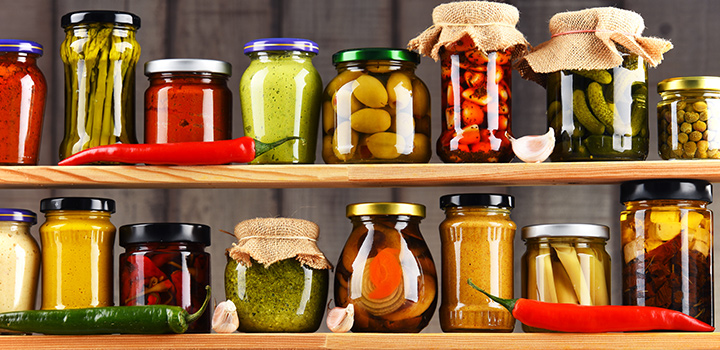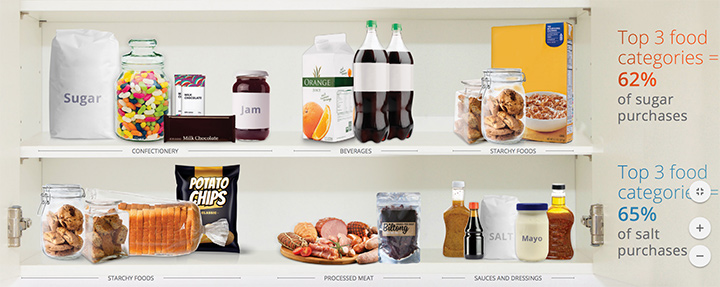A peek into South African pantries

Coffee, cow's milk, fatty foods, wine – good or bad for you? Over the years, nutrition recommendations about what's healthy and what's not have swung from one extreme to another, leaving us hungry and confused!
You don't have to look hard to find a plethora of nutrition advice. In the words of Jacques Rousseau, a lecturer in critical thinking and ethics at the UCT School of Management Studies:
"We are bombarded with claims made in the name of science. Headlines tell us – often in language of absolute certainty - what is safe or unsafe to eat. The onslaught is even worse on the internet and on social media, where hyperbole seems to have completely replaced considered evaluation of complex issues. The problem is that we have to take our guidance from somewhere, given that few of us have the knowledge to make fully-informed choices about what to eat. So when having to make choices under these conditions of uncertainty, many of us might simply choose to eat what we always have, or what our parents fed us."
From the sometimes contradictory advice found in bestselling recipe books, fad diets and television ads, it’s no wonder that most people no longer know what to believe, or what to eat.
So who can we trust? Rousseau reminds us to be discerning: "Subject experts have a place, because they are informed and competent to assess far more of the evidence, more competently, than we are. Listen to them, rather than to enthusiastic wellness bloggers or lifestyle gurus."
What do the experts agree on?
Almost all nutrition experts lean towards eating more legumes and vegetables. Dr David Katz of the Yale-Griffin Prevention Research Centre, says: "A diet of minimally processed foods close to nature, predominantly plants, is decisively associated with health promotion and disease prevention."
Discovery analysis for the Vitality ObeCity Index 2017 also confirms that adding healthy protein, wholegrains, nuts and seeds to the veggies in your basket can help lower your Body Mass Index, and so promote a healthy weight.
All this doesn't mean that we have to become vegan. But it does mean cultivating a habit of choosing whole foods (such as raw, fresh ingredients) over processed foods, and limiting non-nutritious, health-harming foods (such as those high in sugar, salt and unhealthy fats).
It starts in our kitchens
A good place to start is by relooking what we typically buy and stock when we’re feeling peckish. According to the 2017 Vitality ObeCity Index, which analysed data from Vitality members living in six cities across South Africa, these are the top offenders contributing to too much sugar and salt in our diets:

Cutting down on these purchases will go a long way in lowering our salt and sugar intake. And that's important, because we're currently consuming double the recommended daily maximum!

At this rate, South Africans are on the fast track to obesity and a host of chronic diseases of lifestyle. Discovery Vitality dietitian Terry Harris offers these handy pointers to help you curb the cravings, and the calories!
3 pointers for packing your fridge or pantry
- Stock up on healthy to snack on - fresh fruit, raw unsalted nuts and seeds, raw vegetables (like carrots, celery, cucumber, baby tomatoes) and plain yoghurt are healthy snacks that you can enjoy as is without any preparation.
- Avoid products that have added sugars listed among the first two or three ingredients on the label, such as "sugar", "maltose", "brown sugar", "corn syrup", "cane sugar", "honey" and "fruit juice concentrate".
- Buy prepared healthy foods to save time, such as pre-cut or frozen fruit and vegetables, canned beans or lentils (rinse to remove excess salt) and omega-3 rich canned fish (sardines, salmon or pilchards).

Terry Harris
Head Dietitian: Discovery Vitality
Terry, a registered dietitian, has been working in nutrition for over 13 years. She has been involved in private practice clinical nutrition as well as the food industry in her role as the dietitian for a major food retailer. Terry obtained her Masters degree in Nutrition from the Centre of Excellence, North West University. Terry's extensive knowledge and experience in dietetics and nutrition enable her to address the core purpose of her role of being responsible for providing clinical input into projects and activities that drive and enable the nutrition strategy for Vitality.Looking for more healthy tips and tried-and-tested recipes?
South African soil abounds in fantastic produce all year round, and the Vitality HealthyFood Studio seasonal delights course explores some lesser-known fruits and vegetables and help you to create delicious, healthy meals, throughout the year.
Earn rewards for smart shopping choices
Now that you know to make better decisions when buying food, activate Discovery Vitality's HealthyFood benefit and get up to 10% cash back at Pick n Pay and Woolworths.
Then find out your Vitality Age and do a Vitality Health Check to increase your cash back to up to 25% at your main partner!
Related articles
Do you live in SA's stoutest city?
If you reside in Port Elizabeth, alas the answer this year is yes! Here's the lowdown on the 2017 Discovery Vitality ObeCity Index, which presents the latest insights on weight status and food purchasing behaviour across the land.
Is city living making us sick?
Traffic jams and air pollution aren't the only banes of an urban lifestyle. Other dangers lurk in our kitchen cupboard...
Many seemingly innocuous foods contain high amounts of sugar, the overconsumption of which can lead to obesity. Be a 'grocery-shelf Sherlock' by learning to spot harmful sugars lurking in your grocery list.